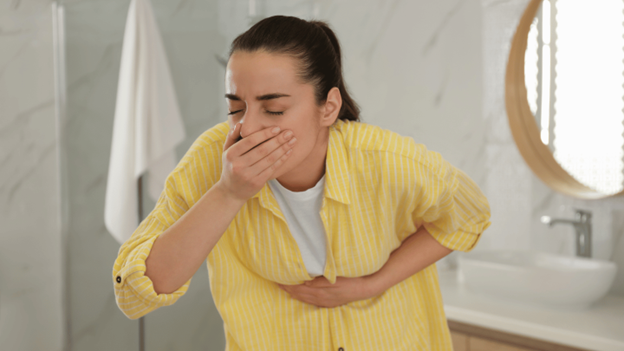
Norovirus incubation period: how long until you get sick?
It starts with a seemingly harmless moment. Maybe you touched a doorknob, ate at a buffet, or shook hands with someone who seemed fine. A day or two later, you’re hit with sudden nausea, stomach cramps and endless trips to the bathroom.
That’s the tricky thing about norovirus—it doesn’t make you sick right away. It takes time to work its way through your system before symptoms appear. But how long does it take? And if you’ve been exposed, what should you do?
Let’s break it down—how long norovirus takes to show up, when you’re most contagious and how to stop the spread before it wreaks havoc on your household.
Norovirus incubation period: what to expect after exposure.
Unlike some illnesses that take a week or more to develop, norovirus moves fast. Once exposed, most people start feeling sick within 12 to 48 hours.
What happens during the incubation period?
The incubation period is the time between exposure and the first symptoms. Even though you don’t feel sick yet, the virus is already multiplying in your intestines.
Here’s what’s happening inside your body:
- The virus enters your system. This usually happens through contaminated food, water, or surfaces.
- It starts replicating. Norovirus quickly spreads in the digestive tract, hijacking healthy cells.
- You feel fine—for now. Even though the virus is active, symptoms haven’t kicked in yet.
- Sudden onset of illness. Once the virus reaches high levels, symptoms appear suddenly and severely.
How contagious are you during incubation?
You’re not as contagious during the incubation period—but that changes quickly once symptoms begin. As soon as vomiting or diarrhea starts, you can easily spread the virus to others through direct contact or contaminated surfaces.
Next, let’s look at how long it takes for norovirus symptoms to appear and how long they last.
How long does norovirus take to cause symptoms?
Norovirus doesn’t waste time. Most people develop symptoms within 12 to 48 hours after exposure. Unlike some viruses that start slow, norovirus hits suddenly and hard—often without warning.
Common norovirus symptoms and when they appear.
| Symptom | When It Starts | Severity |
| Nausea | First symptom, within 12–48 hours | Mild to severe |
| Vomiting | Rapid onset, often intense | Can last 1–2 days |
| Diarrhea | Follows vomiting, watery but non-bloody | Lasts 2–3 days |
| Stomach cramps | Can start early or with vomiting | Mild to intense |
| Fever and chills | Within first 24 hours | Usually low-grade (99–101°F) |
| Muscle aches | Can develop after fever | Mild, flu-like discomfort |
How long do norovirus symptoms last?
The worst symptoms usually peak within 24 to 48 hours. While norovirus is short-lived, it can leave you feeling drained for days. Most people recover within 2 to 3 days, but some may feel weak or dehydrated even after symptoms stop.
Can you spread norovirus before symptoms appear?
Yes. Norovirus is extremely contagious. But once symptoms start, you become even more infectious. Even after symptoms go away, you can still spread the virus for up to two weeks through stool and contaminated surfaces.
Since norovirus spreads so easily, stopping the virus early is key. Let’s go over the best ways to prevent the spread after exposure.
Preventing the spread of norovirus after exposure
Norovirus spreads quickly and aggressively, especially in crowded places like schools, offices and households. If you’ve been exposed or just started feeling sick, taking the proper steps can stop the virus from infecting others.
1. Wash your hands—A LOT.
Regular handwashing is the best way to prevent norovirus from spreading. Hand sanitizer won’t cut it—norovirus is resistant to alcohol-based sanitizers.
Wash your hands with soap and water for at least 20 seconds, especially:
- Before eating or preparing food
- After using the bathroom
- After changing diapers or cleaning up vomit
- Before touching your face or mouth
2. Disinfect surfaces (and do it right!)
Norovirus can survive on surfaces for days or even weeks. Standard cleaners won’t kill it, so use a bleach-based disinfectant to wipe down high-touch areas like:
- Doorknobs
- Light switches
- Countertops
- Bathroom sinks and toilets
- Phones and remote controls
Pro tip: A solution of 1 cup bleach to 1 gallon of water is effective for disinfecting.
3. Avoid preparing food for others.
If you’re sick or have been exposed, stay out of the kitchen. Norovirus spreads through contaminated food, so let someone else handle meals until at least 48 hours after symptoms stop.
4. Wash clothes and bedding immediately.
Vomiting and diarrhea can leave behind invisible virus particles. Wash soiled clothes, towels and bedsheets in hot water and dry them on the highest heat setting.
5. Stay home until you’re in the clear.
Norovirus is highly contagious, even after symptoms stop.
To protect others:
- Stay home for at least 48 hours after your symptoms are gone.
- Avoid close contact with infants, older adults and immunocompromised individuals.
- Drink plenty of fluids to prevent dehydration while you recover.
Need help managing norovirus? CityMD can help.
Norovirus is miserable, but in most cases, it resolves on its own with rest and hydration. However, severe dehydration can be dangerous. If you or a loved one is experiencing persistent vomiting, dizziness, or signs of dehydration, CityMD urgent care is here to help.
Walk into your nearest CityMD for fast, expert care—no appointment needed. Let’s get you feeling better, faster.

We’re ready to care for you.
Visit any CityMD urgent care location in your community today for an evaluation with one of our expert providers.